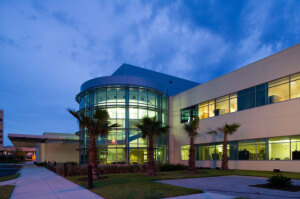by
John R. Fischer, Senior Reporter | September 06, 2023

UF Health Proton Therapy Institute
The University of Florida Health Proton Therapy Institute has reopened its fifth treatment room, marking the completion of a $44 million, three-phase expansion and upgrade project that has been underway for seven years and will allow more cancer patients access to proton therapy.
The institute
announced the project in 2016,
choosing IBA to install a single-room compact ProteusOne system that would increase patient capacity by 25% and upgrade its existing proton therapy technologies. Through these innovations, it can now personalize treatment for individual cases using every available delivery technique, including double scattering, uniform scanning, and pencil beam scanning.
Opened in 2006, the facility started out with four treatment rooms, three of which have gantries and one that is a fixed-beam room. All were powered by one cyclotron. During the first phase, IBA added rolling floors under treatment tables in two gantries, a new imaging system, and a new treatment planning system.




Ad Statistics
Times Displayed: 45002
Times Visited: 1379 Keep biomedical devices ready to go, so care teams can be ready to care for patients. GE HealthCare’s ReadySee™ helps overcome frustrations due to lack of network and device visibility, manual troubleshooting, and downtime.
It then installed the ProteusOne System in the second phase, starting treatments with it in December 2019. It temporarily closed one of its original gantries for the third phase, which it completed this past month with the installation of a dedicated nozzle that facilitates pencil beam scanning. It also added cone beam computed tomography to all three original gantries.
“We are able to optimize treatment delivery for each patient and customize it for the best results,” said Dr. Nancy Mendenhall, medical director of the UF Health Proton Therapy Institute, in a statement.
The institute now has two cyclotrons for powering its rooms, and the upgrades enable it to treat new disease sites, including esophageal cancer, additional head and neck cases, and more pediatric cases.
The 98,000-square-foot facility currently treats approximately 100 patients daily, which adds up to roughly 750 to 800 completed treatment courses annually. It has treated over 11,000 patients from northeast Florida, all 50 states, and 34 countries.

